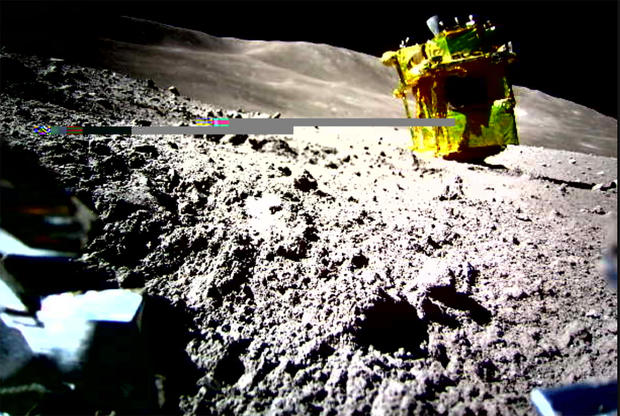
Japanese flight controllers re-establish contact with tipped-over SLIM moon lander
Japanese flight controllers re-established contact with the robotic SLIM lunar lander Saturday, eight days after the spacecraft tipped over and lost power as it was touching down on Jan. 19, the Japan Aerospace Exploration Agency announced Sunday.
An engine malfunction moments before landing caused the Smart Landing for Investigating (the) Moon, or SLIM, spacecraft to drift to one side during its final descent instead of dropping straight down to the surface.
That lateral velocity apparently caused the probe to tilt over as it touched down, leaving its solar cells, attached to the top of the lander, facing away from the sun. Without solar power, the spacecraft was forced to rely on the dwindling power in its on-board battery.
JAXA
After downloading a few photographs and collecting as much engineering data as possible, commands were sent to shut the spacecraft down while it still had a small reserve of battery power.
Lunar Reconnaissance Orbiter photographed the SLIM landing site last week from an altitude of 50 miles, showing the spacecraft as a tiny speck of reflected light on the moon’s cratered surface:
No details were immediately available Sunday, but the team said in a post on X that it “succeeded in establishing communication with SLIM last night and have resumed operations! We immediately started scientific observations with MBC (multi-band camera), and have successfully obtained first light.”
The target was a nearby rock formation nicknamed “toy poodle.”
It was not immediately known if enough power was available to recharge SLIM’s battery, how long engineers expected the spacecraft to operate with the available power or whether it might be shut down again to await additional power generation.
Despite its problems, SLIM successfully landed on the moon, making Japan the fifth nation to pull off a lunar landing after the United States, the former Soviet Union, China and India
Three commercially developed robotic landers launched over the last few years from Japan, Israel and the United States all suffered malfunctions that prevented intact landings.
A fourth commercial lander, built by Houston-based Intuitive Machines, is scheduled for launch next month.
More
More
Source: cbsnews.com